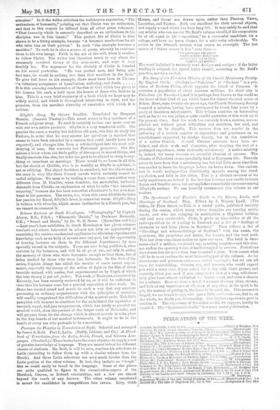Sibylles Story. By Octave Feuillet. Translated by Margaret Watson. (Samuel
Tinsley:)—This novel seems to be a specimen of a French religious story. To read it certainly makes one more content with our own native products. Sibylle is a very wonderful child. She puzzles the curd, a worthy but indolent old man, sets him to study the Fathers, in order that he may answer her questions (a method that seems to have been attended by a success that could hardly have been expected), and changes him from a self-indulgent into the most self- denying of men. She converts her Protestant governess. She dis- misses a lover whom she finds guilty of disrespect to sacred things, and finally converts him also, but is far too good to be allured to stoop to any- thing so mundane as marriage. There would be no harm in all this, but the sketch of Clotilde, who is as worldly as Sibylle is spiritual, is not so edifying. The object doubtless is excellent, but the object apart. the story is very like those French novels which certainly cannot be called religious. We seem to be reading a scene from some author very different from M. Feuillet, when Gandrax, the materialist, furiously demands from Clotilde an explanation of what be calls "her atrocious coquetry," because she has been somewhat affectionate to her own hus- band in his presence. The scene, too, when this same Clotildo declares her passion for Raoul, Sibylle's lover, is somewhat warm. Sibylle's Story is written with vivacity, which seems instinctive in a French pen, but we cannot recommend it.


































 Previous page
Previous page